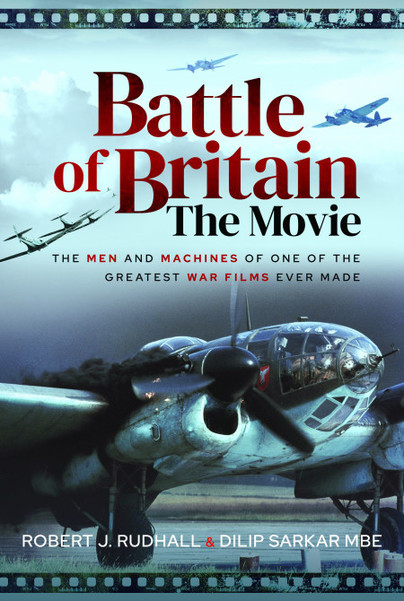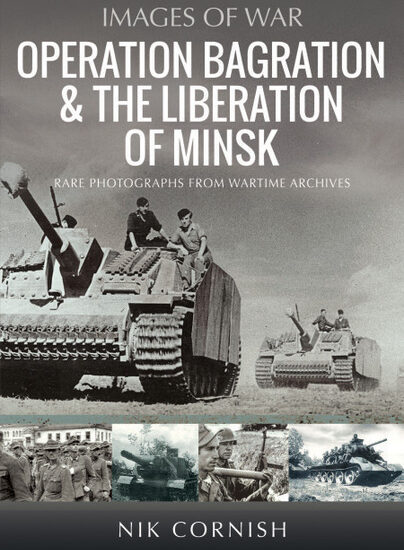Author Guest Post: Dilip Sarkar MBE
The Battle of Britain on the Big Screen: The Finest Hour in British Cinema
During the Second World War, the British film industry produced a number of films concerning the conflict, all of which were, by necessity, heavily myth-laden and propagandised – foremost amongst them The First of the Few, the romanticised story of the Spitfire’s designer, which was the biggest grossing film of 1942. Moreover, the Ministry of Information permitted the likes of Pathe and Movietone to produce morale-boosting clips of fighter pilots and squadrons. All of these were important mediums for the government to provide the public information and reassurance – and were of their time.


In the immediate post-war period there were no British aviation war films, but the first, Angels-One-Five in 1952, was well-received, confirming that the Battle of Britain was a commercial commodity. Indeed, over the next few years, many famous war heroes published their memoirs, or had books written about them, including the legless Group Captain Douglas Bader, whose story, Reach for the Sky, told by Paul Brickhill, became a global best-seller in 1956 – followed a year later by Lewis Gilbert’s and Daniel Angel’s film of the same name, starring Kenneth More, which dominated that year’s box office and became a massive money-spinner. In 1957, however, Roy Ward Baker’s film The One That Got Away, was popular with the public but drew fire from reviewers for heroicising a German airman, Franz von Werra, something post-war Britain was not ready for. Indeed, in all British war films to date, the Germans were largely ridiculed. The next big aviation war film, 633 Squadron, did not feature the Battle of Britain, instead telling the story of a Mosquito squadron’s raid on a German rocket factory. Star-studded, using real aircraft and in colour, the film was also profitable at the box office, indicating that such films remained worth making from a commercial perspective.
The Battle of Britain on film to date, however, had focussed upon the story of individuals, not the big story – which Ben Fisz and Guy Hamilton did in their star-studded Battle of Britain epic, released in 1969. Using real aircraft in another colour production, the film ignited a whole new wave of interest in the ‘Finest Hour’, generating the vintage warbird and aviation archaeology movements. Between the release of Reach for the Sky in 1957 and Battle of Britain in 1969, much had changed for modern Britain: the Empire was lost; Britain was bankrupt and had became a vassal of America; there was a new world order dominated by the United States and Soviet Union; austerity was over and the younger generations had disposable income – with most seeking to distance themselves from their parents’ generation’s values and to whom the Second World War simply did not resonate. West Germany was also a valued partner in NATO, and for this and other reasons many felt that the story of Britain’s pivotal moment in the war was something best buried and forgotten. Indeed, the overall box office reaction to Battle of Britain reinforced this view – hence why it was the last big screen treatment for many years. Nonetheless, the film still enjoys a sizeable enthusiast cult.

The advent of television also had a negative effect on the comparatively small British film industry, the industry now dominated by Hollywood where the Battle of Britain story had no currency. It took, in fact, until 1988 for a new rendition of the Battle of Britain story to appear on television, this time a serial adaptation of Derek Robinson’s novel Piece of Cake (1983), concerning ‘Hornet Squadron’s romp through the Battles of France and Britain. The novel was a revisionist look at 1940 and the Few, largely accurate, it must be said, but came across as disrespectful, angering survivors. The TV series, featuring real aircraft and out-takes from Battle of Britain, received poor reviews. Nonetheless, the first episode attracted over 12 million viewers, reducing by the last to 9.2 million, indicating that there remained interest in the subject, even if the approach was not altogether popular.
Three years later, Nigel Havers starred in a television series, Perfect Hero, loosely based upon Battle of Britain Spitfire pilot Richard Hillary’s wartime classic The Last Enemy, regarding his experiences having been shot down and grievously burned. Again, reviews were poor, although the series ranked number eleven in the top fifty dramas broadcast that year, weekly viewing figures never dropping below 9 million. It was not the hoped-for success, however, and the last Battle of Britain portrayal for some time.

In 2001, the Battle of Britain returned to the big screen with Jan Svěrák’s Dark Blue World, although this was a Czech production, concerning the story of Czechoslovak pilots serving in the RAF, and therefore beyond the scope of this proposed book. Nonetheless, it is interesting to note that, again, the aerial footage was well-received whilst reviewers were otherwise divided. Nevertheless, the film grossed $2.3 million worldwide, again indicating that there remained, even so long after the event, a commercial market for Battle of Britain stories.
Nine years on, in 2010, the Battle of Britain’s seventieth anniversary year, the subject returned to Britain TV screens when Matthew Whiteman’s BBC2 docudrama First Light was broadcast. Essentially a serialisation of Battle of Britain Spitfire pilot Geoffrey Wellum’s best-selling memoir of the same title, cleverly, Whiteman combined footage of Wellum as an old man, talking about the past, with his drama, starring Sam Heughan (Outlander) and real Spitfires. The series was well-received and overall achieved positive reviews. It is, in the opinion of this author, the best portrayal of an individual’s Battle of Britain experience ever likely to be made. At the time of writing, there has been no other British television series or film.

Interestingly, 2018, though, saw the release of two similar Polish films: Denis Delic’s 303 Squadron: The True Story, and Krystian Kozlowski’s Hurricane: 303 Squadron, both presenting romanticised, exaggerated and in some respects downright fictional representations of the famous Squadron’s Battle of Britain story. Both were, rightly, poorly received, and were, according to the Telegraph a ‘Polish-funded take on history’. These films, however, are beyond this particular book’s scope, which concentrates on the British film industry.

The Battle of Britain is an epic story – and, not least because of the need for expensive aeroplanes – a difficult one to translate to cinema. Writing this book and mapping the development of how the Battle of Britain has appeared in British cinema over the years, and considering the various influencing facts, has been a fascinating, and I hope useful, exercise, especially the detailed ‘reading’ of certain key films. It is perhaps surprising, though, that overall and with the exception of Guy Hamilton’s 1969 Battle of Britain film, the summer of 1940, certainly in respect of the overall story, has been poorly served by cinema. Also, considering the importance of ‘The Finest Hour’ to the British national identity, it has been featured infrequently in television drama – Matthew Whiteman’s excellent BBC2 docudrama First Light being the most recent, produced for the seventieth anniversary in 2010. It is doubtful whether this will ever change, now, and so Battle of Britain and First Light may well represent the high points of the Battle of Britain in British cinema and on television.

Whilst academic historians remain vexed and continue debating the merits or otherwise of history on film, there is an argument that unfaithful though some ‘historical’ films are to the actual facts, they can be of value through igniting interest in the viewer and inspiring a need to know more. All kinds of benefits for the historical record could arise from such a circumstance. Having first watched Battle of Britain as an eight-year-old schoolboy upon release in 1969, were that not the case, I would not be writing this…

Now, we just await release of our forthcoming, updated, version of the late Robert Rudhall’s Battle of Britain: The Movie, which I originally published via my Ramrod Publications operation in 2000. With the help of Peter Arnold and Gary Brown, and one or two other friends, the new edition features fulsome updates and many new photographs, in addition to a whole new 12,000-word section by yours truly concerning historical accuracy (also reproduced in this book). The new book has been unavoidably delayed but is now signed-off and with the printer so not tool long now – and for we enthusiasts a real treat awaits.

In the meantime, best wishes to one and all for a Happy Christmas and a wonderful New Year.
Dilip Sarkar MBE FRHistS, 21 December 2022
Dilip’s website.
Dilip’s YouTube channel.
Order The Battle of Britain on the Big Screen here.
Pre-order Battle of Britain: The Movie here.



